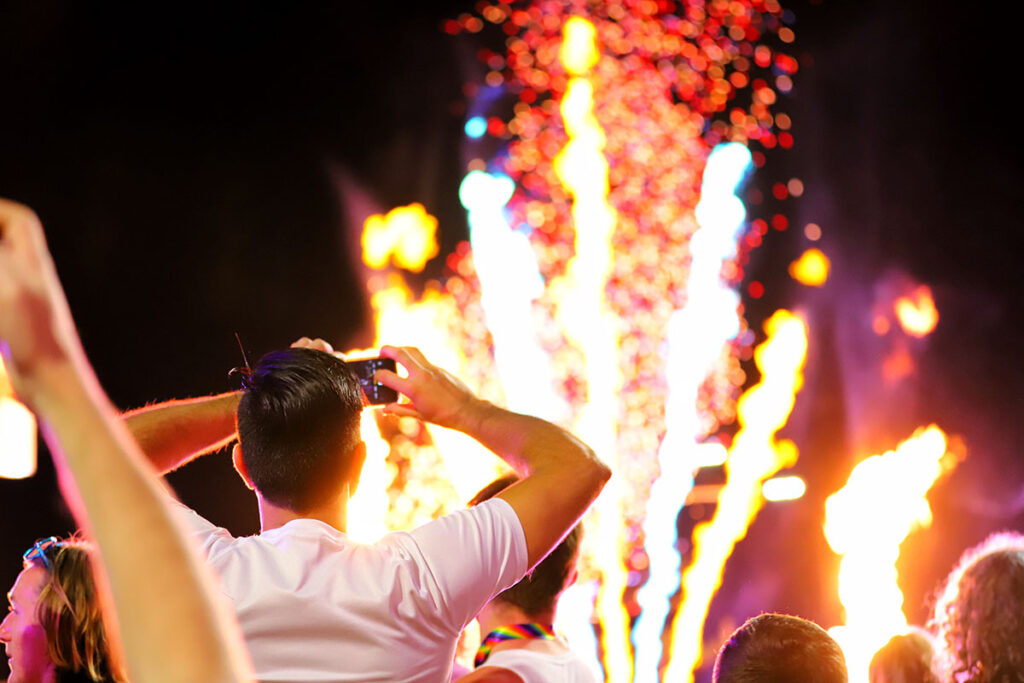Firework Safety Negligence: Protecting Yourself from Life-Changing Brain Injuries
Fireworks are a hallmark of celebration—from Independence Day to New Year’s Eve to sporting events. But while these explosive displays light up the night sky, they can also unleash serious danger when mismanaged. Among the most devastating outcomes of firework-related accidents are traumatic brain injuries (TBIs). TBIs are life-altering injuries that can result from just a few moments of negligence.
Everyone should be careful around fireworks. However, the biggest responsibility belongs to those in charge of hosting or organizing firework displays. Whether it’s a hotel hosting a rooftop show, a city permitting a public celebration, or a company staging a private event, the duty to protect guests and bystanders is critical. When that duty is ignored, the consequences can be catastrophic. These injuries often fall under the legal concept of premises liability.

The Hidden Dangers of Fireworks
Most people associate fireworks with minor burns or noise, but their danger goes far beyond that. Fireworks can explode unpredictably, misfire into crowds, or send debris falling from the sky. These accidents can result in burns, eye injuries, hearing damage, and blunt force trauma. Among the most serious and often overlooked injuries are those affecting the brain.
A traumatic brain injury can occur when the force of a blast wave jolts the brain inside the skull, even if there’s no direct physical contact. This type of injury, sometimes classified as a “closed-head injury,” may not be visible on the surface but can lead to profound and lasting damage. Victims may experience memory loss, difficulty concentrating, personality changes, motor skill impairments, and emotional disturbances. In severe cases, TBIs can lead to permanent disability or even death.
Who’s Liable When Fireworks Go Wrong?
Some fireworks accidents result from personal misuse. Some are due to negligence by those responsible for planning and executing firework shows. Organizers may cut corners or fail to follow safety guidelines, putting crowds at unnecessary risk.
This is where premises liability becomes a crucial legal factor. Property owners and managers can be held liable when someone is injured on their property. They are responsible for preventing unsafe conditions and warning guests of hazards.
Some people who could be held liable when a fireworks show goes wrong:
- Event Organizers who fail to hire licensed professionals or follow fire safety guidelines

- Hotels and Resorts that allow unauthorized fireworks on their property or fail to maintain safe distances
- Property Owners who neglect crowd control, safety signage, or protective barriers
- Firework Display Companies that use defective equipment or lack proper training
- Municipalities that approve unsafe show permits or fail to enforce safety codes
Each of these actions—or inactions—can lead directly to injury or death. When organizations ignore their responsibilities, they can and should be held accountable. Victims can do so through premises liability claims.
How Negligence Can Lead to TBI
One of the most insidious aspects of firework-related injuries is how quickly a seemingly controlled environment can become dangerous. A firework that misfires into a crowd can strike someone in the head with tremendous force. Debris falling from an overhead blast can cause skull fractures. In chaotic scenes, people may trip or fall while fleeing, hitting their heads on concrete or metal barriers. Even being too close to the concussive force of a large blast can jolt the brain, causing damage without any visible injury.
Many victims don’t realize they’ve suffered a traumatic brain injury until symptoms begin appearing days or weeks later. Unfortunately, by then, the damage may already be irreversible. Victims may have grounds for a premises liability lawsuit. This is especially true if the injury occurred on private or commercial property where safety was not properly managed.
How to Stay Safe at Firework Events
Property owners and organizers bear significant responsibility for keeping guests safe. But, you can also take steps to protect yourself and your loved ones:
- Stay at least 500 feet away from professional displays to reduce the risk of flying debris or blast exposure.
- Never attend unsanctioned or “backyard” shows at unfamiliar venues. Attending professionally managed firework shows overseen by licensed pyrotechnicians is always safer.
- Avoid standing under balconies or rooftops where unsanctioned fireworks may be launched.

- Keep children and pets closely supervised.
- Watch for warning signs of disorganization or lack of crowd control
- Report unsafe conditions to authorities
- Wear ear protection and stay alert to your surroundings
But even the safest bystander can be harmed when the people in charge fail to act responsibly. Don’t hesitate to leave if something feels off.
What to Do If You’re Injured at a Firework Display
If you or a loved one suffers an injury—especially a suspected TBI—after a fireworks incident, seek medical attention immediately. Brain injuries can worsen without prompt diagnosis and care. Once stable, it’s essential to document everything. Take photos, get contact information from witnesses, and keep a record of your medical visits.
Next, consider whether premises liability may apply. Were you on a property where the organizers failed to follow safety regulations? Was there poor crowd control or insufficient signage? Did hotel or venue staff ignore risks? If so, you may be entitled to pursue legal action for compensation.
At this point, contacting a personal injury attorney is critical. These cases often involve multiple potential defendants. Event coordinators, property owners, municipalities, or firework companies could potentially be held responsible. A skilled attorney can investigate the scene, determine liability, and build a case that gets you a fair resolution.
Protecting Your Future After a Traumatic Injury
At Snellings Law, we understand that life after a traumatic brain injury is never the same. Medical expenses pile up. Work becomes impossible. Relationships suffer. And too often, victims are left to shoulder the burden of someone else’s negligence.
That’s where we come in.
We fight for victims of fireworks-related injuries—especially those suffering from TBIs and other catastrophic injuries. Our team works with medical experts, safety engineers, and accident investigators. We build a compelling case and help you recover for:
- Medical bills and ongoing treatment
- Lost wages and reduced earning capacity

- Pain and suffering
- Emotional trauma
- Long-term disability care and life planning
It’s important to hold negligent parties accountable. You deserve more than just an apology. You deserve answers, justice, and the resources to rebuild your life.
If you or a loved one has suffered a serious injury due to fireworks negligence, don’t wait. Contact Snellings Law today at (214-387-0387) for a free, no-obligation consultation. We’ll review your case, explain your rights, and help you take the next step toward healing.
How it works:
- Call us now or give us your basic information in the Free Strategy Session box
- If your case is something we cannot help you with, we will do our best to get you the information of someone who can.
- If we can potentially help you, we will schedule a Free Strategy Session
There is zero obligation. We want all injury victims to understand their rights and the process.
After your Free Strategy Session, you will understand where insurance companies can set traps for you and what needs to be done to avoid these traps. You will also understand the personal injury process as well as how we can help, or if you need the help of an attorney. The strategy session typically will have one of three outcomes. You:
- Decide to move forward with our law firm.
- Decide to think about it, and we will be available to answer your questions.
- Say, “I’ve got this,” and decide you do not need an attorney.
Again, there is zero obligation and you will be informed and understand your rights and the process. We want to arm you with knowledge to avoid the traps insurance companies set to harm your claim.

